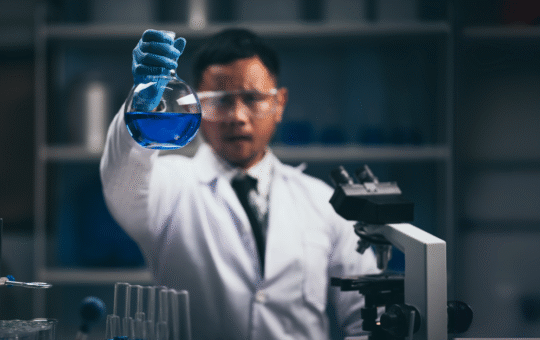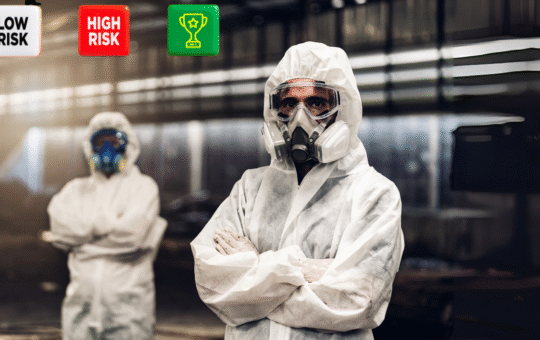
Level 3 Certification in Environmental Sustainability in Chemical Engineering
- Sustainable Engineering Knowledge: Gain in-depth understanding of sustainability concepts in chemical engineering, focusing on eco-friendly processes.
- Practical Skills: Learn how to design and implement energy-efficient systems, reduce waste, and apply green chemistry principles to chemical processes.
- Industry Relevance: The course addresses the growing need for sustainability in the chemical industry, preparing learners to meet industry demands for more environmentally conscious practices.
- Environmental Impact: Develop the ability to evaluate and mitigate the environmental impacts of chemical engineering projects.
- Career Progression: Ideal for those seeking to work in sustainable chemical engineering, process optimization, or environmental compliance roles in industries like chemicals, pharmaceuticals, and energy.
- Understand the principles of environmental sustainability in chemical engineering and why sustainability is crucial for the chemical process industries.
- Be able to identify environmental risks associated with chemical processes and develop strategies to mitigate these risks.
- Gain practical skills in applying green chemistry principles, such as using renewable feedstocks, minimizing waste, and designing safer, more efficient processes.
- Learn methods for energy efficiency and resource conservation in chemical engineering operations.
- Understand life cycle analysis (LCA) and how it is used to evaluate the environmental impact of chemical products and processes.
- Explore technologies and systems for waste management, including the reduction, recycling, and disposal of industrial waste.
- Develop an understanding of environmental regulations and standards, including ISO 14001 for environmental management.
- Introduction to Environmental Sustainability in Chemical Engineering
- Overview of the global challenges related to environmental sustainability in chemical industries.
- The importance of incorporating sustainability in chemical engineering practices.
- Understanding green chemistry and its role in minimizing negative environmental impacts.
- Key principles of sustainable engineering and their applications in chemical processes.
- Green Chemistry and Sustainable Chemical Processes
- Introduction to the concept of green chemistry and its importance in reducing environmental hazards.
- Techniques to green chemical processes: reducing the use of hazardous materials, designing more sustainable reactions, and developing eco-friendly alternatives.
- The role of solvent selection, energy efficiency, and renewable feedstocks in sustainable processes.
- Case studies of green chemical innovations and their environmental benefits.
- Energy Efficiency in Chemical Engineering
- The importance of energy efficiency in reducing the carbon footprint of chemical operations.
- Methods for optimizing energy usage in chemical manufacturing processes.
- The role of heat integration, cogeneration, and alternative energy sources in improving energy efficiency.
- Techniques for improving the energy efficiency of pumps, reactors, and separation processes in chemical plants.
- Sustainable Resource Usage
- The principles of resource conservation and their application in chemical engineering.
- Techniques for reducing water usage, minimizing material consumption, and maximizing the efficiency of raw material utilization.
- Sustainable sourcing of raw materials: using renewable resources and reducing dependency on non-renewable feedstocks.
- The importance of circular economy principles in the chemical industry.
- Waste Management and Pollution Control
- Understanding the impact of industrial waste on the environment.
- Methods of waste reduction in chemical processes, including waste minimization strategies and clean production techniques.
- Introduction to waste recycling, upcycling, and waste-to-energy technologies.
- Techniques for handling hazardous waste, ensuring compliance with environmental standards, and safe disposal practices.
- Environmental Impact Assessment (EIA) and Life Cycle Analysis (LCA)
- The role of EIA in identifying the environmental risks and impacts of chemical engineering projects.
- Introduction to Life Cycle Analysis (LCA): how to evaluate the environmental impact of chemical products and processes from raw material extraction to disposal.
- Conducting an EIA and LCA for a chemical process or product to make informed sustainability decisions.
- Understanding the role of LCA in improving the sustainability of manufacturing practices.
- Environmental Regulations and Standards
- An overview of key environmental regulations and standards relevant to chemical engineering, including ISO 14001 for environmental management systems.
- Understanding environmental compliance and the legal responsibilities of chemical engineers.
- The role of environmental audits and sustainability reporting in ensuring compliance and driving continuous improvement.
- Developing strategies to ensure that chemical engineering practices align with global sustainability goals.
- Sustainability Consultant
- Environmental Engineer
- Process Engineer (with a focus on sustainability)
- Chemical Production Manager
- Energy Efficiency Specialist
- Waste Management Coordinator
- Environmental Compliance Officer
- Sustainable Process Design Engineer
- Real-World Sustainability: Learn practical, industry-specific techniques for integrating sustainability into chemical processes.
- Industry-Relevant Learning: The course is designed to align with industry trends and regulations related to environmental sustainability.
- Qualified Trainers: Learn from industry professionals with hands-on experience in sustainable chemical engineering and environmental management.
- Career-Focused: This certification enhances your ability to lead sustainable practices and pursue career growth in the chemical and process industries.
- Comprehensive Approach: Gain an understanding of green chemistry, energy efficiency, waste management, and regulatory compliance, all of which are critical for modern chemical engineers.
Study Units
- Introduction to Environmental Sustainability in Chemical Engineering
- Overview of the global challenges related to environmental sustainability in chemical industries.
- The importance of incorporating sustainability in chemical engineering practices.
- Understanding green chemistry and its role in minimizing negative environmental impacts.
- Key principles of sustainable engineering and their applications in chemical processes.
- Green Chemistry and Sustainable Chemical Processes
- Introduction to the concept of green chemistry and its importance in reducing environmental hazards.
- Techniques to green chemical processes: reducing the use of hazardous materials, designing more sustainable reactions, and developing eco-friendly alternatives.
- The role of solvent selection, energy efficiency, and renewable feedstocks in sustainable processes.
- Case studies of green chemical innovations and their environmental benefits.
- Energy Efficiency in Chemical Engineering
- The importance of energy efficiency in reducing the carbon footprint of chemical operations.
- Methods for optimizing energy usage in chemical manufacturing processes.
- The role of heat integration, cogeneration, and alternative energy sources in improving energy efficiency.
- Techniques for improving the energy efficiency of pumps, reactors, and separation processes in chemical plants.
- Sustainable Resource Usage
- The principles of resource conservation and their application in chemical engineering.
- Techniques for reducing water usage, minimizing material consumption, and maximizing the efficiency of raw material utilization.
- Sustainable sourcing of raw materials: using renewable resources and reducing dependency on non-renewable feedstocks.
- The importance of circular economy principles in the chemical industry.
- Waste Management and Pollution Control
- Understanding the impact of industrial waste on the environment.
- Methods of waste reduction in chemical processes, including waste minimization strategies and clean production techniques.
- Introduction to waste recycling, upcycling, and waste-to-energy technologies.
- Techniques for handling hazardous waste, ensuring compliance with environmental standards, and safe disposal practices.
- Environmental Impact Assessment (EIA) and Life Cycle Analysis (LCA)
- The role of EIA in identifying the environmental risks and impacts of chemical engineering projects.
- Introduction to Life Cycle Analysis (LCA): how to evaluate the environmental impact of chemical products and processes from raw material extraction to disposal.
- Conducting an EIA and LCA for a chemical process or product to make informed sustainability decisions.
- Understanding the role of LCA in improving the sustainability of manufacturing practices.
- Environmental Regulations and Standards
- An overview of key environmental regulations and standards relevant to chemical engineering, including ISO 14001 for environmental management systems.
- Understanding environmental compliance and the legal responsibilities of chemical engineers.
- The role of environmental audits and sustainability reporting in ensuring compliance and driving continuous improvement.
- Developing strategies to ensure that chemical engineering practices align with global sustainability goals.
Upon completing the Level 3 Certification in Environmental Sustainability in Chemical Engineering, learners will:
- Understand the principles of environmental sustainability in chemical engineering and why sustainability is crucial for the chemical process industries.
- Be able to identify environmental risks associated with chemical processes and develop strategies to mitigate these risks.
- Gain practical skills in applying green chemistry principles, such as using renewable feedstocks, minimizing waste, and designing safer, more efficient processes.
- Learn methods for energy efficiency and resource conservation in chemical engineering operations.
- Understand life cycle analysis (LCA) and how it is used to evaluate the environmental impact of chemical products and processes.
- Explore technologies and systems for waste management, including the reduction, recycling, and disposal of industrial waste.
- Develop an understanding of environmental regulations and standards, including ISO 14001 for environmental management.
This course is tailored for individuals passionate about combining chemical engineering expertise with environmentally responsible practices. It is ideal for:
Early-Career Chemical Engineers
Recent graduates or diploma holders in chemical engineering looking to specialize in sustainable practices and gain an edge in environmentally focused roles.
Process Engineers and Technicians
Professionals currently working in manufacturing, oil & gas, or pharmaceuticals who are involved in chemical production and wish to adopt greener, more efficient methodologies.
Environmental and Safety Professionals
HSE officers and environmental coordinators aiming to deepen their knowledge of sustainable chemical operations and align their workplace practices with global environmental standards.
R&D and Product Development Teams
Individuals working in research or product formulation roles who want to integrate green chemistry principles into their design and development processes.
Quality and Compliance Personnel
Quality assurance professionals focused on environmental compliance, auditing, and reporting who need to understand how chemical processes impact sustainability and regulation adherence.
Industrial Plant Managers and Supervisors
Those overseeing plant operations who want to enhance energy efficiency, resource conservation, and waste management strategies at their facilities.
Individuals Seeking a Career Shift
Professionals in other engineering or technical disciplines exploring opportunities in sustainability, green manufacturing, or environmental engineering within the chemical sector.
Our assessment process is designed to ensure every learner achieves the required level of knowledge, skills, and understanding outlined in each course unit.
Purpose of Assessment
Assessment helps measure how well a learner has met the learning outcomes. It ensures consistency, quality, and fairness across all learners.
What Learners Need to Do
Learners must provide clear evidence that shows they have met all the learning outcomes and assessment criteria for each unit. This evidence can take different forms depending on the course and type of learning.
Types of Acceptable Evidence
Assignments, reports, or projects
Worksheets or written tasks
Portfolios of practical work
Answers to oral or written questions
Test or exam papers
Understanding the Structure
Learning outcomes explain what learners should know, understand, or be able to do.
Assessment criteria set the standard learners must meet to achieve each learning outcome.
Assessment Guidelines
All assessment must be authentic, current, and relevant to the unit.
Evidence must match each assessment criterion clearly.
Plagiarism or copied work is not accepted.
All learners must complete assessments within the given timelines.
Where applicable, assessments may be reviewed or verified by internal or external quality assurers.
Full learning outcomes and assessment criteria for each qualification are available from page 8 of the course handbook.
Top Courses
Related Courses
Let's Get in touch
Deleting Course Review
Course Access
This course is password protected. To access it please enter your password below:



